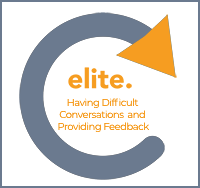Having Difficult Conversations and Providing Feedback
Code: ETCDCPF
Duration: 1 Day
Delivery methods: Classroom, Virtual Learning, Onsite Event
Price per delegate: $500.00


Relationships can often seem like fragile things – especially in the workplace, where they can be built and destroyed by the actions we take. By underpinning those relationships with a few simple principles, they can grow into something secure and lasting. Organizations can only function with the cooperation of their members. By building on the willingness and skills to work together, we can develop positive, cooperative, and respectful relationships. Positive relations within the workplace are essential if an organization is to achieve its long and short-term business goals.
Anyone who wishes to improve their personal and working relationships
This one-day event is specifically designed to provide you with the opportunity to identify how others impact you, and your own personal communication style and to develop your skills to build effective working relationships.
By the end of the course, you should be better able to:
Introduction to difficult conversations:
Here we identify what constitutes a difficult conversation, when we use them, and when it is appropriate to do something different.
We use a range of case studies to help participants to differentiate between several scenarios.
Preparing for discussions and challenging assumptions
In this session, we discuss whether or not to hold a difficult conversation, how to prepare for it, and what evidence should be gathered for it.
This is done as a syndicate exercise.
Key behaviors required for holding difficult conversations
Participants discuss, in groups, the skills and behaviors they need in order to carry out a constructive conversation.
Tools for holding difficult conversations
Good communication skills are crucial for a successful conversation. This session will give participants tools for managing their body language, speaking persuasively, active listening, and asking high-quality questions.
Recognising workplace behaviours
In order to be able to manage challenging situations, it is important to recognize the behavior. Here we use the “OK Corral” to explain different behaviors and how they manifest themselves.
Introduction to feedback
In this session, we start off by discussing feedback, what it is, and why it is important. The group will discuss how feedback can be given and why it often presents a problem for us.
We then follow this by introducing a model for giving feedback. At this point, in considering feedback as a two-way process, we also discuss how to receive feedback.
Structuring a difficult conversation
Here we build on the previous sessions by providing participants with a framework for holding difficult conversations that they can use in the workplace or their personal lives. We do this through group discussions and syndicate exercises.
Putting it into practice
Participants will try out some of the tools and techniques discussed throughout the day by holding conversations in groups of three. This will enable them to put their skills into practice and receive constructive feedback in a safe environment
Action planning
Participants identify the actions they will take from the training and use back in the workplace.